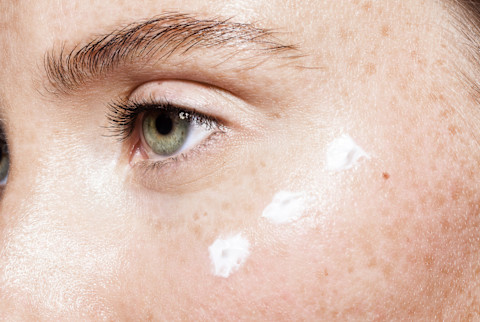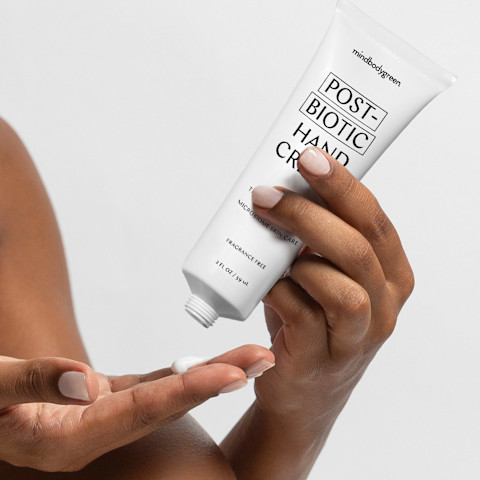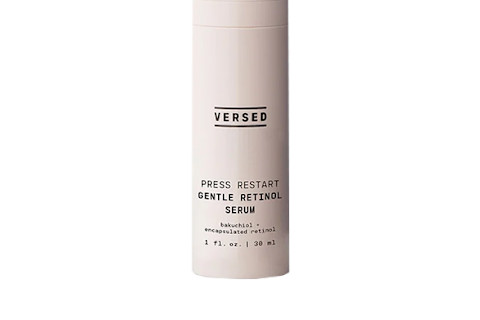Winter Retinol FAQ: All Your Burning Questions Answered By Derms

It's no secret retinol is one of the top darlings of skin care, beloved by derms for its ability to enhance cell turnover, promote collagen production, even out hyperpigmentation, and so much more. But if you've recently embarked on your retinol journey, you're likely familiar with some of its common side effects: burning, irritation, dryness, and skin peeling, also dubbed the "retinoid reaction" or retinoid-induced dermatitis.
And if you plan to use retinol during the winter? Those side effects may only become more clear: cold, wintry air, after all, can exacerbate dryness, peeling, and irritation. That's not to say you must tuck away your retinol until the weather finally thaws—you just have to be smarter about how you use it.
You're in luck: We collected some burning questions from the mbg office and compiled a retinol guide just in time for the upcoming winter season.
Is winter a good or bad time to start using a retinol?
Technically, there is no "perfect" season to start using retinol. Sure, winter may come with some extra dryness, but your skin may be exposed to more sun during the summer (and retinol can increase photosensitivity, which is why you should always use it at night).
If you do begin your retinol journey during winter, "just be aware that it is always best to start slowly," says board-certified dermatologist Loretta Ciraldo, M.D., FAAD. "Consider applying the product sparingly—only Monday, Wednesday, and Friday—for the first two to three weeks. If no redness, peeling, or irritation develops, you can increase the frequency of use to nightly."
Should you decrease to a lower-strength retinol during the winter?
"Actually, the answer here is a bit complicated," says Ciraldo. If you're having no trouble with your retinol (i.e., no irritation, redness, or peeling), then feel free to carry on with your usual routine. If you are facing increased irritation during winter, Ciraldo suggests first checking whether you're using a retinol or retinoid.
Retinol is strictly the OTC version, which means it's less potent and usually less irritating; retinoid, on the other hand, is the blanket term for the entire category of vitamin A derivatives, including both OTC and prescription-strength options—the latter of which can lead to more irritation.
That said, you may need to switch up the type of retinol you're using rather than resorting to a lower concentration. Perhaps find one that comes buffered with hyaluronic acid or ceramides, which can help mitigate some of that dryness.
Says Ciraldo, you can also edit your frequency: "Try using the product at half the frequency you are now using," she notes. (Like one to two days per week instead of three to four.) "And always apply retinol in front of a well-lit mirror; never apply it to areas that are red, dry, or irritated," she adds. Then, if you're experiencing irritation with these changes, Ciraldo suggests swapping with a lower-strength product.
Can you still use your retinol while traveling?
Well, it depends on the type of trip: If you're going on a quick trip to an area with a pretty stark climate change (like a ski trip, if you live in a less snowy area), Ciraldo recommends leaving your retinol at home.
"Your skin may take days to adjust to the new climate conditions, and I don't believe it's worth the downtime that may come with the climate adjustment," she explains. Similarly, "If you are planning a winter beach getaway, I'd leave the retinol home since you can develop sun sensitivity from it," she adds.
However, if you're spending more than a week in a new place (aside from the beach), she recommends stashing the retinol in your suitcase. Just keep an eye on your skin to see if you need to reduce the frequency.
What ingredients should you avoid pairing your retinol with?
Do not mix retinoids with AHAs and BHAs—not only can the ingredients inactivate each other, but the retinol and chemical exfoliator will be far too damaging for your skin. It will only result in more irritation. You also shouldn't use vitamin C (namely, L-ascorbic acid) and retinol at the same time, as this combo can also inactivate the ingredients. That's why derms recommend using vitamin C as your daytime active and retinol for nighttime repair.
Now, you can exfoliate on nights you don't use your retinol (assuming your skin can fully tolerate it); just make sure you take some nights off for skin recovery.
"It's like when you go to the gym, you need days to recover. The same thing holds true for the skin barrier and the microbiome," says board-certified dermatologist Whitney Bowe, M.D., on the mindbodygreen podcast. "You want to use a retinol? Go for it. You want to use an AHA, like glycolic acid? Go for it, but give yourself two nights off when you're just using nourishing, hydrating ingredients."
On that note, Bowe suggests sticking to niacinamide, hyaluronic acid, peptides, prebiotics, and glycerin, as these ingredients play nicely with retinoids. "The trick is you want to look for ingredients that are soothing, calming, and hydrating," she says in a TikTok.
Can you still use a retinol if you have dry or peeling skin from blowing your nose in the winter?
It's a tricky question, considering dry skin around the nose can be caused by weather and skin care products, like retinol. "Environmental conditions like cold or dry air, cold wind, windburn, sunburn, or chronic sun exposure can all irritate the sensitive skin around the nose and cause dryness," board-certified dermatologist Raechele Cochran Gathers, M.D., tells mbg about the concern. She adds, "Retinoids, whether used for acne or wrinkles, can irritate the sensitive skin around the nose."
The fix here is to avoid applying the retinol onto this area—or any excessively dry skin—during the winter months. Once the peeling subsides, you could also switch to a gentler form of retinol, says Ciraldo, or find a product laced with ingredients that soothe sensitive skin, such as jojoba oil, glycerin, ceramides, and hyaluronic acid.
Why is it best to apply retinol on dry skin? What if your skin is already parched dry?
In case you didn't know, you should apply retinol on clean, dry skin. "It is best to wait at least 10 minutes after cleansing before applying retinol if you have dry skin," says Ciraldo. "This will limit the risk of burning or irritation." Not to mention, applying on clean, dry skin helps the active better penetrate the skin cells.
Now, this poses a bit of an issue if your main concern is skin dryness during the winter—for some, waiting 10 minutes before slathering on a moisturizer sounds like a recipe for cracked, scaly skin. That said, you can always find a serum that includes moisturizing ingredients or opt for a retinol moisturizer with a cream base.
Or, you can use what derms call the "sandwich method" and apply your retinol between layers of moisturizer. "Apply moisturizer on your cleansed skin first, then apply retinoid, and finish with another layer on top," says dual board-certified dermatologist Aegean H. Chan, M.D., FAAD, in an Instagram video. Not only does this trick keep your skin hydrated during the winter, but the physical barrier also dilutes the potent active, which can help reduce any irritation.
What are other tricks to use retinol and minimize irritation?
In addition to the sandwich method referenced above, you can also select a winter-friendly moisturizer to help mitigate any dryness. "Always, always, always use a moisturizer on top of your retinoid. For winter, you might want to use something a bit thicker and more occlusive," says Chan. See here for our favorite butter-thick options.
If you have hypersensitive skin, you can also use your retinol as a wash-off mask—a concept known as short-contact therapy. Essentially: You cleanse your face, apply your retinol, leave it on for a few minutes, then wash it off before continuing with the rest of your skin care routine. "Less retinoid on your skin equals less irritation," says Chan.
And there's even a clinical trial to support its success: Participants were tasked with applying 0.05% tretinoin cream (a prescription-strength retinoid) once daily for 30 minutes before washing it off, for about 12 weeks. Not only were they more compliant with their tube of tretinoin1 (read: reduced flaking and irritation), but it also helped improve their various skin care concerns. So retinoids can still yield their cell turnover benefits—even if you don't leave it on all night long.
The takeaway
If you're using retinol during the winter, it makes sense you would have some questions, as both retinoids and cold weather can have similar side effects on your skin. Feel free to reference these FAQs (or send us some more; we'll update it!), see below for a few favorite picks, or find our full list of best retinol serums here.




